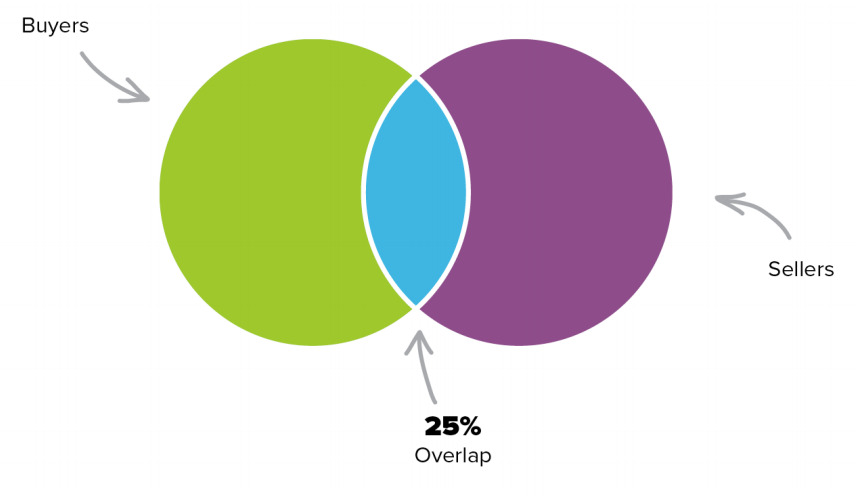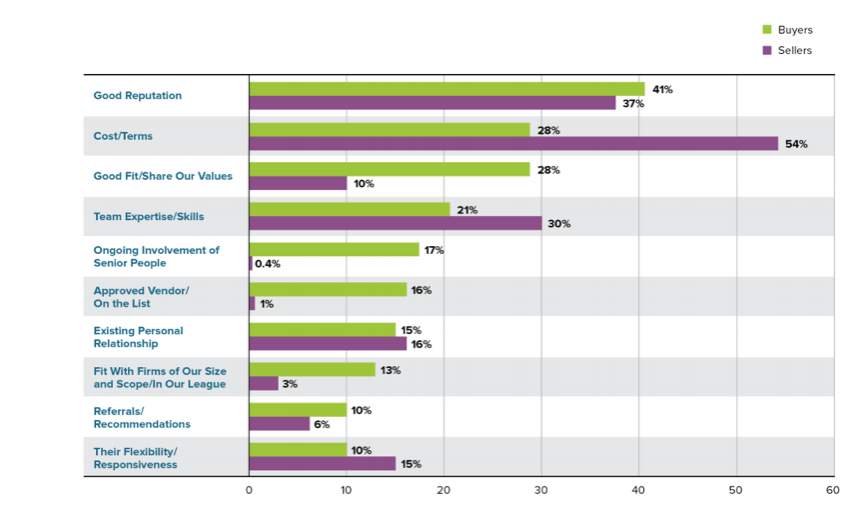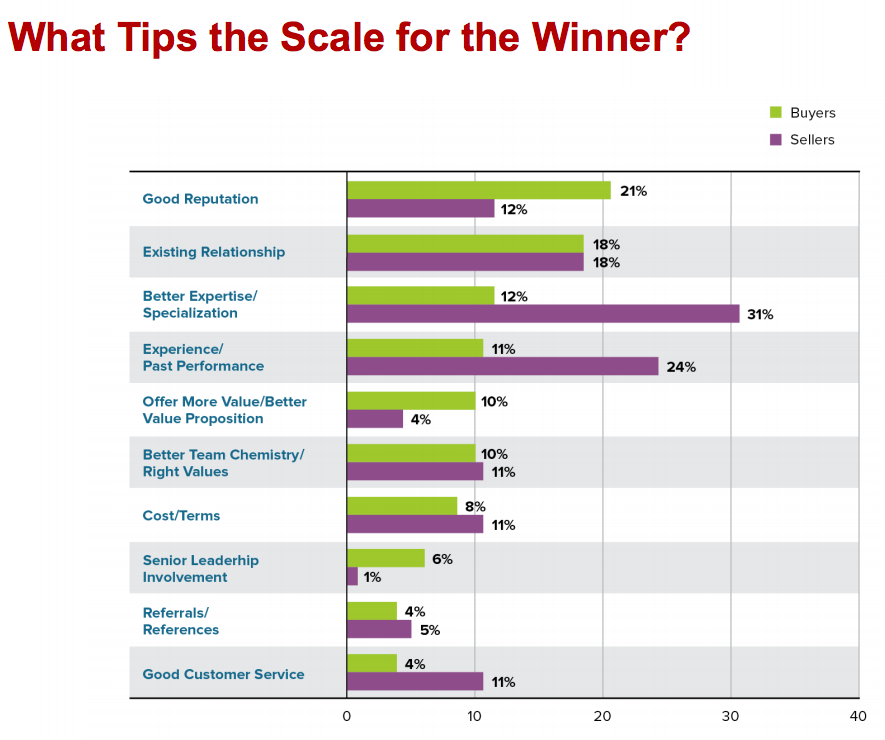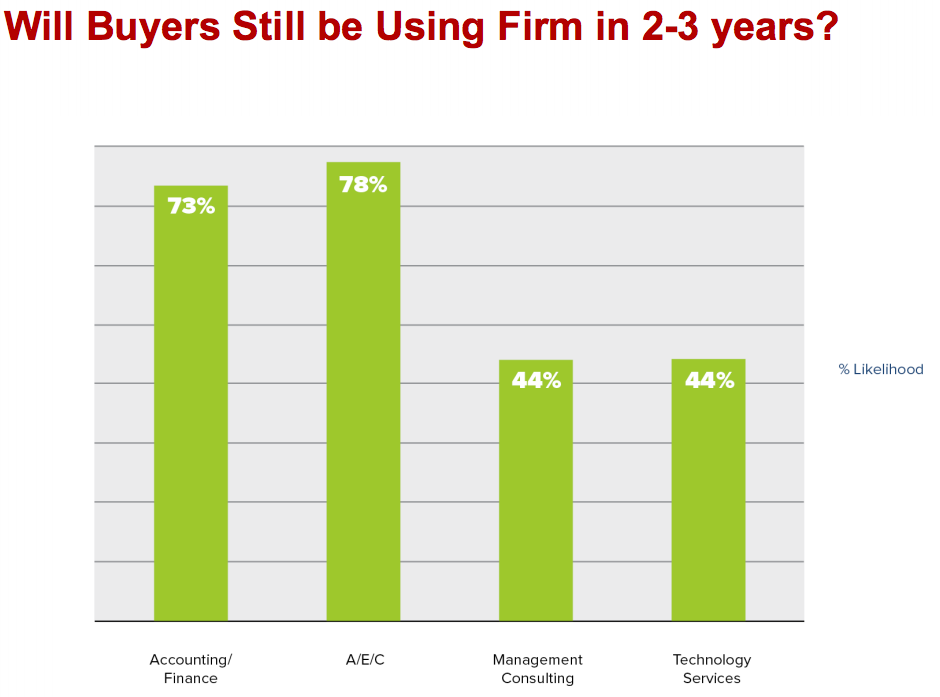How Buyers Choose Vendors: Top 5 Selection Criteria
The following post is a guest post by Ottomatias Peura from Leadfeeder.
Understanding how buyers choose vendors, and placing yourself in the buyer’s seat is a great way to gain insight into the best tactics for nurturing and pitching. There’s tremendous value in keeping tabs on the criteria that your potential customers use to choose their suppliers.
You already have several tools at your disposal to help you find out what your sales prospects are thinking about. You can search Google, forums, social media communities and industry-specific authority publications for articles with advice on what to look for when choosing a solution in your niche.
This type of monitoring will likely yield more than enough material for you at the start, but think about what you are seeing. Most likely, the sources you’re reading are written by someone on the sales side, who has a vested interest in promoting their own products, or buyers who are writing based on their personal experiences, which may or may not represent the experiences of their peers.
How can you find the most useful information on buyers’ thought processes? By asking them. That’s exactly what Hinge Marketing recently did, and the results are fascinating.
Using a research sample of some 1500 buyers and sellers in the B2B sector, Hinge Marketing identified key criteria across five key industries:
- accounting/finance
- architecture/engineering/construction
- technology
- legal
- management consulting
Many of the criteria they identified, like existing relationships and word of mouth, might already be on your radar. Others may surprise you. Let’s take a look at some of the most noteworthy takeaways from Hinge’s report–as well as some insights from additional research studies.
One in four buyers skips the research
Hinge found that 24% of buyers claim they already know what they need to when it comes to searching for a new supplier. The confidence that they already “know it all” is something that could be costing your potential customers a lot of cash.
If the solution you’re offering differs considerably from everything else out there, then you might find it extra challenging to educate these people. On the other hand, if your product can save your customers a lot of money, then you may be able to pique their interest into finding out why and how.
When it comes to skeptical or over-confident buyers, you’ll need to prove the value you provide–in detail. Just don’t give away your company’s trade secrets or render yourself irrelevant in the process.
Your competition isn’t who you think
Hinge asked buyers to list the firms they were considering as finalists for contracts and then asked sellers to list the firms they consider to be their top competitors. The two lists only had about 25% overlap. In other words, you likely aren’t even aware of some three-quarters of the companies that are also interested in selling to your leads.
That’s no small number, and it’s definitely worth taking into account when you think about how to approach a competitive market. “Competition” can mean different things in different contexts, but it’s important to remember that in the when it comes to B2B sales, there’s a good chance that you have limited familiarity with the companies you’re bidding against. All suppliers need to carefully balance between aggressive under-bidding and strategically drawing your own lines in the sand.
The idea of teaming up with your rivals might sound disadvantageous, but you’d be surprised. With a little luck and ingenuity, you could turn that competition into joint contracts or new service offerings, and potentially increased production capabilities for both of you. This is a huge point to consider–playing nice can pay off, if you work to grow relationships with your competitors as well as your sales leads.
[clickToTweet tweet="Turning competition into joint contracts or new service offerings! Playing nice pays off." quote="Turning competition into joint contracts or new service offerings! Playing nice pays off."]
Common values are important
Good reputation and price points are key criteria buyers use when searching for vendors. One factor many buyers use might surprise you, however. Shared values are often an extremely important aspect of vendor choice.
Anyone can offer a product–it’s the companies that “stand for something” that are the most memorable. Values can manifest themselves as operational priorities too, with major implications on working relationships, as this post by Mind Tools points out:
The best business relationships are based on closely matching workplace values. This is why looking at the supplier's business culture is important. For example, what if your organization's most important value is quality, and your main supplier cares more about meeting deadlines? This mismatch could mean that it's willing to cut corners in a way that could prove to be unacceptable to you.
You won’t always have values in common with your customers, but when you do, make sure you use this alignment to your advantage. Take this one step further by being forthcoming about your brand values and making this a central aspect of your potential customers’ decision-making processes.
Buyers tap their networks
Reputation may hold more weight than existing relationships when it comes to vendor selection, but both factors are highly influential. Some 71% of buyers turn to their professional networks in order to identify potential suppliers, gather referrals and research details. People don’t like to do business with strangers, which is why warming up your leads via extended periods of nurturing is so effective.
Buyers are also likely to carefully evaluate vendors based on with whom they’ve worked before–whether that’s to judge your ability to handle the job or to feel out potential conflicts of interest.
Gossip is, of course, an extension of this. You should actively seek out referrals whenever possible. And expect that your customers and prospects will talk with each other.
Your digital footprint matters
Not everyone likes to learn about the options that they have at their fingertips (see above), but in general, once a buyer has identified his or her pain points, the research for solutions can begin in earnest. According to data from marketing automation platform Pardot, approximately 72% of buyers will turn to Google during their initial research for educational info, reviews, testimonials and the like.
Then they start whittling their list down into finalists. Once the initial search is over, 41% of buyers consider good reputation one of their top selection criteria for suppliers, 16% more check their company’s existing approved vendor lists, and an additional 10% turn to referrals.
Even if you aren’t aware that someone is researching you, remember that someone out there just might be looking into your company, its reputation and products right now. What will they find? Keeping your reputation clean online and offline can play a major role in your ability to close deals.
Information makes a difference
The journey towards purchase is something more marketers are starting to focus on, and it’s about time. Buyers’ criteria for vendor selection vary at different stages of their journeys, and your team should be ready to greet potential customers with the answers they are looking for at every step.
Provide your potential customers with more information than they need for any given stage. They’ll appreciate it, and you might just gain an edge over your competition.
One place you may not want to spend as much time is producing content for trade publications. Although they might have a large audience in your niche, Hinge Marketing’s research shows that only 1% of buyers turn to trade and business publications to help them find suppliers and vendors.
Buyers are prone to switching vendors
You might envision the ideal buyer relationship as lasting for several years. Hinge Marketing’s research suggests that this might be unrealistic. Turns out that about 44% of buyers in the management consulting and technology services industries expect to be working with the same vendor for a maximum of two to three years.
The rest of the industries included in the study have mixed results. In architecture, engineering, and construction, the odds are a little better, with 78% expect to continue using the same provider. In accounting and finance, 73% expect to be still working with the same provider.
The lesson? Don’t get too comfortable and dependent on the same clients renewing contracts and placing repeat orders. On the upside, there are plenty of potential clients you can land–even if someone tells you he or she is happy with a current supplier.
Putting it all together
To close deals with new buyers, providing the information they're looking for can be incredibly useful. Listening to their questions in forums, on social media and in person can help you grow your customer base quickly by providing the answers to their questions with content–white papers, blog posts and infographics are especially impactful–tailored to their position in the buyer’s journey. Just keep in mind that not all buyers will be aware that they need your expertise.
You need to prove your value without giving away too many of your secrets. Expect competition, but keep it friendly–after all, a sale is a sale. Most importantly, be genuine, keep your reputation clean online and offline, actively ask for referrals and make sure your company’s values shine through.







